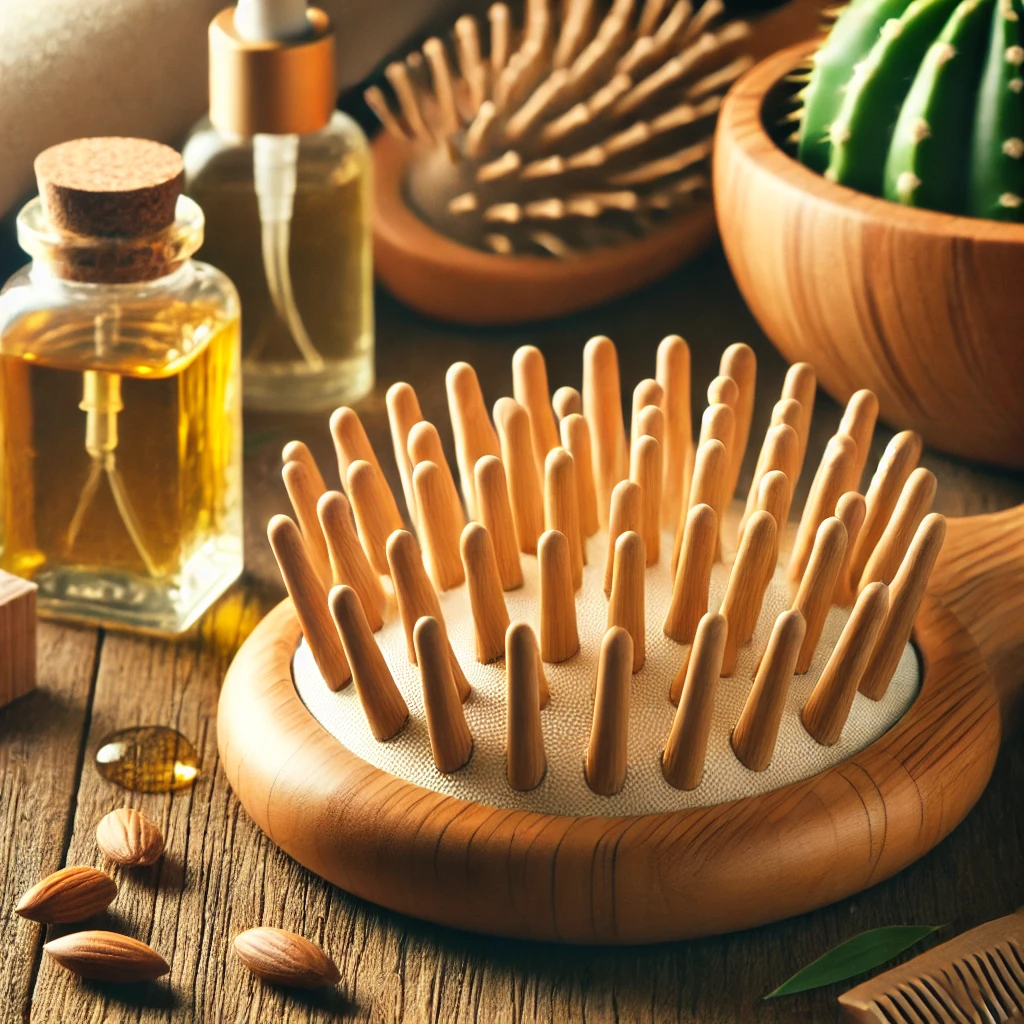Why a Bamboo Hair Brush is the Secret to Healthier, Shinier Hair
Bamboo Hair Brushes and Their Benefits
The Rise of Bamboo Hair Brushes in Hair Care
In recent years, bamboo hair brushes have gained significant popularity among those seeking healthier, shinier hair. These eco-friendly tools are not just a trend but a revolution in hair care. Unlike traditional plastic brushes, bamboo hair brushes offer a range of benefits that cater to both hair health and environmental sustainability. The natural properties of bamboo make it an ideal material for hair brushes, providing a gentle yet effective way to care for your hair.
Bamboo is a sustainable resource that grows rapidly without the need for pesticides or fertilizers. This makes bamboo hair brushes an excellent choice for environmentally conscious consumers. Additionally, bamboo has natural antimicrobial properties, which help keep the brush clean and free from bacteria. This is particularly beneficial for those with sensitive scalps or those prone to scalp infections.
How Bamboo Hair Brushes Promote Healthier Hair
One of the primary reasons bamboo hair brushes are considered superior to their plastic counterparts is their ability to promote healthier hair. The bristles of a bamboo hair brush are typically made from natural materials such as boar bristles or bamboo itself. These bristles are gentle on the scalp and help distribute the natural oils produced by the scalp evenly along the hair shaft.
This natural oil distribution is crucial for maintaining the health and shine of your hair. When the natural oils are evenly distributed, they help to moisturize the hair, preventing dryness and breakage. Additionally, the gentle massaging action of the bamboo bristles stimulates blood flow to the scalp, promoting hair growth and overall scalp health.
The Environmental Impact of Bamboo Hair Brushes
In today’s world, where environmental concerns are at the forefront of many consumers’ minds, the choice of a bamboo hair brush is a step towards a more sustainable lifestyle. Traditional plastic brushes contribute to the growing problem of plastic waste, which takes hundreds of years to decompose. In contrast, bamboo is a biodegradable material that breaks down naturally, reducing its impact on the environment.
Moreover, the production process of bamboo hair brushes is generally more eco-friendly compared to plastic brushes. Bamboo requires less water and energy to grow and process, making it a more sustainable option. By choosing a bamboo hair brush, consumers can reduce their carbon footprint and contribute to the preservation of the planet.
The Science Behind Bamboo Hair Brushes
Understanding the Structure of Bamboo Bristles
To fully appreciate the benefits of bamboo hair brushes, it is essential to understand the science behind their design. The bristles of a bamboo hair brush are typically made from natural materials such as boar bristles or bamboo itself. These bristles are designed to be gentle on the scalp while effectively detangling and smoothing the hair.
Boar bristles, in particular, are known for their ability to mimic the natural texture of human hair. This similarity allows the bristles to glide through the hair without causing damage or breakage. Additionally, the natural texture of boar bristles helps to distribute the scalp’s natural oils evenly along the hair shaft, promoting moisture and shine.
The Role of Natural Oils in Hair Health
The natural oils produced by the scalp, known as sebum, play a crucial role in maintaining the health and appearance of hair. Sebum acts as a natural conditioner, moisturizing the hair and protecting it from environmental damage. However, for sebum to be effective, it needs to be evenly distributed along the hair shaft.
This is where bamboo hair brushes excel. The natural bristles of a bamboo hair brush help to distribute sebum from the roots to the tips of the hair. This even distribution ensures that each strand of hair receives the necessary moisture, resulting in healthier, shinier hair. Additionally, the gentle massaging action of the bristles stimulates the scalp, promoting blood flow and encouraging hair growth.
The Antimicrobial Properties of Bamboo
Another significant advantage of bamboo hair brushes is their natural antimicrobial properties. Bamboo contains a substance called “bamboo kun,” which has natural antibacterial and antifungal properties. This makes bamboo an ideal material for hair brushes, as it helps to keep the brush clean and free from harmful bacteria.
For individuals with sensitive scalps or those prone to scalp infections, the antimicrobial properties of bamboo can be particularly beneficial. By using a bamboo hair brush, they can reduce the risk of scalp irritation and infections, promoting overall scalp health.
Practical Benefits of Using a Bamboo Hair Brush
Gentle Detangling Without Breakage
One of the most practical benefits of using a bamboo hair brush is its ability to detangle hair gently without causing breakage. Traditional plastic brushes often have rigid bristles that can pull and tear at the hair, leading to damage and split ends. In contrast, the natural bristles of a bamboo hair brush are designed to glide through the hair smoothly, reducing the risk of breakage.
For individuals with long or thick hair, detangling can be a challenging task. A bamboo hair brush makes this process easier and less painful, as the bristles work to separate knots and tangles without pulling on the hair. This gentle detangling action helps to preserve the integrity of the hair, keeping it strong and healthy.
Enhancing Hair Shine and Smoothness
Another practical benefit of bamboo hair brushes is their ability to enhance hair shine and smoothness. The natural bristles of a bamboo hair brush help to distribute the scalp’s natural oils evenly along the hair shaft, resulting in a glossy, smooth finish. This natural shine is often difficult to achieve with synthetic brushes, which can leave the hair looking dull and lifeless.
In addition to distributing natural oils, bamboo hair brushes also help to smooth the hair cuticle. The cuticle is the outermost layer of the hair shaft, and when it is smooth, the hair reflects light more effectively, creating a shiny appearance. By using a bamboo hair brush, individuals can achieve a salon-quality shine at home, without the need for expensive treatments or products.
Reducing Static and Frizz
Static and frizz are common hair concerns, especially during the colder months or in dry climates. Traditional plastic brushes can exacerbate these issues, as they generate static electricity when used on dry hair. This static can cause the hair to become frizzy and unmanageable, making it difficult to style.
Bamboo hair brushes, on the other hand, are less likely to generate static electricity. The natural materials used in the bristles help to reduce static and frizz, leaving the hair smooth and manageable. This makes bamboo hair brushes an excellent choice for individuals who struggle with frizzy hair, as they can help to maintain a sleek, polished look throughout the day.
Choosing the Right Bamboo Hair Brush and Incorporating It into Your Routine
Selecting the Perfect Bamboo Hair Brush for Your Hair Type
When it comes to choosing a bamboo hair brush, it is essential to consider your specific hair type and needs. Different brushes are designed to cater to various hair textures and lengths, so selecting the right one can make a significant difference in the results you achieve.
For individuals with fine or thin hair, a brush with soft, flexible bristles is ideal. These bristles will be gentle on the scalp and hair, preventing breakage and damage. On the other hand, those with thick or coarse hair may benefit from a brush with firmer bristles, which can more effectively detangle and smooth the hair.
Additionally, consider the size and shape of the brush. A larger brush is suitable for individuals with long or thick hair, as it can cover more surface area and detangle more efficiently. A smaller brush may be more convenient for those with shorter hair or for travel purposes.
Incorporating a Bamboo Hair Brush into Your Daily Routine
Once you have selected the perfect bamboo hair brush, the next step is to incorporate it into your daily hair care routine. Using a bamboo hair brush regularly can help to maintain the health and appearance of your hair, but it is essential to use it correctly to achieve the best results.
Start by brushing your hair gently, beginning at the ends and working your way up to the roots. This approach helps to prevent breakage and ensures that any tangles are removed without causing damage. Be sure to brush your hair thoroughly, but avoid over-brushing, as this can lead to unnecessary stress on the hair and scalp.
In addition to regular brushing, consider using your bamboo hair brush as part of a scalp massage routine. The gentle massaging action of the bristles can stimulate blood flow to the scalp, promoting hair growth and overall scalp health. Spend a few minutes each day massaging your scalp with the brush, focusing on areas where you may experience tension or dryness.
Maintaining Your Bamboo Hair Brush for Longevity
To ensure that your bamboo hair brush remains effective and lasts for a long time, it is essential to maintain it properly. Regular cleaning is crucial, as it helps to remove any buildup of hair, oils, or products that can accumulate on the bristles.
To clean your bamboo hair brush, start by removing any hair that may be trapped in the bristles. Use a comb or your fingers to gently pull the hair out, being careful not to damage the bristles. Next, wash the brush with warm water and a mild soap, using a soft brush or cloth to clean the bristles thoroughly. Allow the brush to air dry completely before using it again.
In addition to regular cleaning, store your bamboo hair brush in a dry, cool place to prevent damage from moisture or heat. Proper storage will help to maintain the integrity of the bristles and ensure that your brush remains effective for years to come.
Final Conclusion
In summary, bamboo hair brushes are more than just a trendy hair care tool—they are a scientifically backed, environmentally friendly solution for achieving healthier, shinier hair. From their natural bristles that promote even oil distribution to their antimicrobial properties that keep the brush clean, bamboo hair brushes offer a range of benefits that make them a superior choice for hair care. By understanding the science behind these brushes, recognizing their practical benefits, and incorporating them into your daily routine, you can unlock the secret to healthier, shinier hair. Whether you are looking to reduce breakage, enhance shine, or simply make a more eco-conscious choice, a bamboo hair brush is a worthwhile investment for anyone seeking to improve their hair care regimen.









